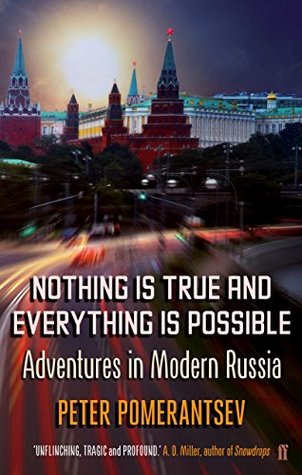More on this book
Community
Kindle Notes & Highlights
TV is the only force that can unify and rule and bind this country. And as a TV producer I would be directed right into the centre of its workings.
mixes show business and propaganda, ratings with authoritarianism. And at the centre of the great show is the President himself, created from a no one, a grey fuzz via the power of television, so that he morphs as rapidly as a performance artist among his roles of soldier, lover, bare-chested hunter, businessman, spy, tsar, superman.
‘The news is the incense by which we bless Putin’s actions, make him the President,’ TV producers and political technologists liked to say.
In London or New York you would spend months trying to get a project off the ground. But TNT is sponsored by the world’s largest gas company. Actually, scratch that; it’s the world’s largest company, full stop.
Everywhere you see advertisements for secretaries or PAs with ‘no complexes’ added in small print at the bottom. The phrase somehow transforms humiliation into an act of personal liberation.
Lena wants to be a pop star. In Moscow they’re known as ‘singing knickers’: girls with no talent but rich sponsors.
than just feared bullies. They were the only people in this lost, new Russia who knew who on earth they were and what they stood for. And now, in the twenty-first century, although many gangsters were out of a job, their way of behaving has become ubiquitous.
Only the gangsters strode tall in glorious Technicolor. This was Vitaly’s town, the representative, cross-section town of Russia, the country where a third of males have been to prison, the sort of town spin doctors and TV men look at when they design politicians.
This isn’t a country in transition but some sort of postmodern dictatorship that uses the language and institutions of democratic capitalism for authoritarian ends.
He offers to not make a speech, instead welcoming the audience to pose questions and have an open discussion. After the first question he talks for almost forty-five minutes, leaving hardly any time for questions after all. It’s his political system in miniature: democratic rhetoric and undemocratic intent.
The Kremlin’s idea is to own all forms of political discourse, to not let any independent movements develop outside of its walls. Its Moscow can feel like an oligarchy in the morning and a democracy in the afternoon, a monarchy for dinner and a totalitarian state by bedtime.
‘Old walls and doors know something we can’t understand,’ Mozhayev wrote in one of his essays, ‘the true nature of time. The drama of human lives is written in the buildings. We will be gone; only places
remain.’
The Soviet Union occupied 20 per cent of the world’s land mass; its former states produce 15 per cent of the world’s oil. But over 50 per cent of the models on the catwalks of Paris and Milan are from the former USSR.
In a country of nine time zones, stretching from the Baltic to the Pacific, comprising one-sixth of the world’s land mass, where television is the only force that can unify and rule and bind – the great battering ram of propaganda couldn’t possibly ever rest.


